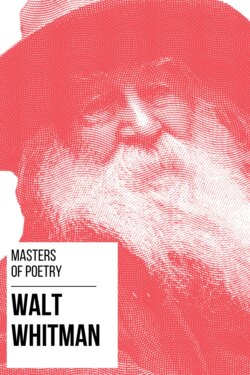Читать книгу Masters of Poetry - Walt Whitman - August Nemo, John Dos Passos, Ellen Glasgow - Страница 55
На сайте Литреса книга снята с продажи.
X
ОглавлениеWhitman was compelled to this negation of extrinsic art by the problem he had set before himself,—first, to arouse, to suggest, rather than to finish or elaborate, less to display any theme or thought than "to bring the reader into the atmosphere of the theme or thought;" secondly, to make his own personality the chief factor in the volume, or present it so that the dominant impression should always be that of the living, breathing man as we meet him and see him and feel him in life, and never as we see him and feel him in books or art,—the man in the form and garb of actual, concrete life, not as poet or artist, but simply as man. This is doubtless the meaning of the vestless and coatless portrait of himself prefixed to the first issue of the "Leaves," to which I have referred. This portrait is symbolical of the whole attitude of the poet toward his task. It was a hint that we must take this poet with very little literary tailoring; it was a hint that he belonged to the open air, and came of the people and spoke in their spirit.
It is never the theme treated, but always the character exploited; never the structure finished, but always the plan suggested; never the work accomplished, but always the impulse imparted,—freedom, power, growth.
"Allons! we must not stop here.
However sweet these laid-up stores, however convenient this dwelling, we cannot remain here,
However sheltered this port, or however calm these waters, we must not anchor here,
However welcome the hospitality that surrounds us we are permitted to receive it but a little while.
"Allons! With power, liberty, the earth, the elements!
Health, defiance, gayety, self-esteem, curiosity;
Allons! from all formulas!
From your formulas, O bat-eyed and materialistic priests!"
This magnificent poem, "The Song of the Open Road," is one of the most significant in Whitman's work. He takes the open road as his type,—not an end in itself, not a fulfillment, but a start, a journey, a progression. It teaches him the profound lesson of reception, "no preference nor denial," and the profounder lesson of liberty and truth:—
"From this hour, freedom!
From this hour I ordain myself loosed of limits and imaginary lines,
Going where I list—my own master, total and absolute,
Listening to others, and considering well what they say,
Pausing, searching, receiving, contemplating,
Gently, but with undeniable will, divesting myself of the holds that would hold me.
"I inhale great draughts of air,
The east and the west are mine, and the north and the south are mine."
He will not rest with art, he will not rest with books, he will press his way steadily toward the largest freedom.
"Only the kernel of every object nourishes.
Where is he who tears off the husks for you and me?
Where is he who undoes stratagems and envelopes for you and me?"
Whitman was not a builder. If he had the architectural power which the great poets have shown, he gave little proof of it. It was not required by the task he set before himself. His book is not a temple: it is a wood, a field, a highway; vista, vista, everywhere,—vanishing lights and shades, truths half disclosed, successions of objects, hints, suggestions, brief pictures, groups, voices, contrasts, blendings, and, above all, the tonic quality of the open air. The shorter poems are like bunches of herbs or leaves, or a handful of sprays gathered in a walk; never a thought carefully carved, and appealing to our sense of artistic form.
The main poem of the book, "The Song of Myself," is a series of utterances, ejaculations, apostrophes, enumerations, associations, pictures, parables, incidents, suggestions, with little or no structural or logical connection, but all emanating from a personality whose presence dominates the page, and whose eye is ever upon us. Without this vivid and intimate sense of the man back of all, of a sane and powerful spirit sustaining ours, the piece would be wild and inchoate.
